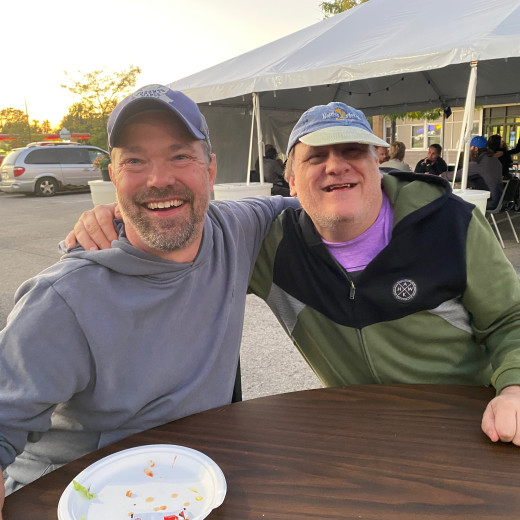Monday
DAY 1: MORNING/MIDDAY OFFICE
Silence and Stillness before God (2 minutes)
Scripture Reading: Matthew 26:36 - 39
Then Jesus went with his disciples to a place called Gethsemane, and he said to them, "Sit here while I go over there and pray" He took Peter and the two sons of Zebedee along with him, and he began to be sorrowful and troubled. Then he said to them, "My soul is overwhelmed with sorrow to the point of death. Stay here and keep watch with me."
Going a little farther, he fell with his face to the ground and prayed, "My Father, if it is possible, may this cup be taken me. Yet not as I will, but as you will."me. Yet not as I will, but as you will"
Devotional
In the garden of Gethsemane, we see Jesus troubled and overwhelmed with sorrow - to the point of death. We see him falling with his face to the ground and praying three times. We also see the Father say no to Jesus' request that the cup be taken away from Him. We want to follow Jesus into the abundant life of resurrection, but we are less than enthusiastic about following him into the garden of Gethsemane. Lament for a Son, by Nicholas Wolterstorff, is a record of the author's reflections and struggles following the death of his twenty five-year-old son, Eric, in an Austrian mountain-climbing accident. Wolterstorff doesn't have any explanations or answers for why God would have allowed such a tragedy. Who does? At one point, how-ever, he comes upon a profound insight:
Through the prism of my tears I have seen a suffering God.
It is said of God that no one can behold his face and live. I always thought this meant that no one can see his splendor and live. A friend said perhaps this meant that no one could see his sorrow and live. Or perhaps his sorrow is splendor.
Question to Consider
What does it mean for you to pray, "Yet not as I will, but as you will?
Lord, everything in me resists following you into the garden of Gethsemane to fall on my face to the ground before you. Grant me the courage to follow you all the way to the cross, whatever that might mean for my life. And then, by your grace, lead me to resurrection life and power. In Jesus name, amen.
Conclude with Silence (2 minutes)
DAY 1: MIDDAY/EVENING OFFICE
Silence and Stillness before God (2 minutes)
Scripture Reading: Job 2:7 - 10So Satan went out from the presence of the LORD and afflicted Job with painful sores from the soles of his feet to the crown of his head. Then Job took a piece of broken pottery and scraped himself with it as he sat among the ashes. His wife said to him, "Are you still maintaining your integrity? Curse God and die!" He replied, "You are talking like a foolish woman. Shall we accept good from God, and not trouble?" In all this, Job did not sin in what he said.
Devotional
Jonathan Edwards, in a famous sermon on the book of Job, noted that the story of Job is the story of us all. Job lost everything in one day: his family, his wealth, and his health. Most of us experience our losses more slowly - over the span of a lifetime - until we find ourselves on the door of death, leaving everything behind. Catastrophic loss by definition precludes recovery. It will transform us or destroy us, but it will never leave us the same. There is no going back to the past.... It is not therefore true that we become less through loss - unless we allow the loss to make us less, grinding our soul down until there is nothing left.... Loss can also make us more... I did not get over the loss of my loved ones; rather, I absorbed the loss into my life, until it became part of who I am. Sorrow took up permanent residence in my soul and enlarged it... One learns the pain of others by suffering one's own pain, by turning inside oneself, by finding one's own soul...However painful, sorrow is good for the soul....The soul is elastic, like a balloon. It can grow larger through suffering. -Jerry Sittser
Question to Consider
How can you see God enlarging your soul through your losses?
Prayer
Father, when I think about my losses, it can feel like I have no skin to protect me. I feel raw, scraped to the bone. Looking at Job and Jesus helps, but I must admit that I struggle to see something new being birthed out of the old. Enlarge my soul through the trials and losses of my life. In Jesus' name, amen.
Conclude with Silence (2 minutes)
Tuesday
DAY 2: MORNING/MIDDAY OFFICE
Silence and Stillness before God (2 minutes)
Scripture Reading: 2 Corinthians 4:7 - 11
But we have this treasure in jars of clay to show that this all-surpassing power is from God and not from us. We are hard pressed on every side, but not crushed; perplexed, but not in despair; persecuted, but not abandoned; struck down, but not destroyed. We always carry around in our body the death of Jesus, so that the life of Jesus may also be revealed in our body.
For we who are alive are always being given over to death for Jesus' sake, so that his life may also be revealed in our mortal body.
Joni Eareckson Tada has been paralyzed from the neck down for over thirty years. As a result, she has experienced both the death of Jesus and the life of Jesus. She says:
The cross is the center of our relationship with Jesus. The cross is where we die. We go there daily. It isn't easy. Normally, we will follow Christ anywhere - to a party, as it were, where he changes water into wine, to a sunlit beach where he preaches from a boat. But to the cross? We dig in our heels. The invitation is so frighteningly individual. It's an invitation to go alone. Suffering reduces us to nothing and as Soren Kierkegaard noted, "God creates everything out of nothing. And everything which God is to use, he first reduces to nothing.? To be reduced to nothing is to be dragged to the foot of the cross. It's a severe mercy.When suffering forces us to our knees at the foot of Calvary, we die to self. We cannot kneel there for long without releasing our pride and anger, unclasping our dreams and desires.... In exchange, God imparts power and implants new and lasting hope.
Question to Consider
How is God bringing you to your knees before him through difficulties and setbacks in your life?
Prayer
Lord, everything in me kicks against going to the foot of the cross where you will root out of me all that is not of you. Help me not to fear the "deaths" it will take for me to be transformed into a free person who loves you and others well. Have mercy on me, O Lord.
In Jesus' name, amen.
Conclude with Silence (2 minutes)
DAY 2: MIDDAY/EVENING OFFICE
Silence and Stillness before God (2 minutes)
Scripture Reading: Psalm 22:1 - 5
My God, my God, why have you forsaken me?
Why are you so far from saving me, so far from my cries of anguish?
My God, I cry out by day, but you do not answer, by night, but I find no rest. Yet you are enthroned as the Holy One;
you are the one Israel praises.
In you our ancestors put their trust; they trusted and you delivered them. To you they cried out and were saved;
in you they trusted and were not put to shame.
Devotional
In the 1870s Horatio Spafford was a successful Chicago lawyer and a close friend of evangelist Dwight L. Moody. Spafford had invested heavily in real estate, but the Chicago fire of 1871 wiped out his holdings. His son had died shortly before the disaster. Spafford and his family desperately needed a rest, so in 1873 he planned a trip to Europe with his wife, Anna, and their four daughters. Yet just before they set sail, a last-minute business development forced Horatio to return to work. Not wanting to ruin the family holiday, Spafford persuaded his family to go as planned, and intended to catch up with them later. With this decided, Spafford returned to Chicago, and Anna and the four daughters sailed to Europe. Unfortunately, their ship collided with an English vessel and sank in only twelve minutes. The accident claimed the lives of 226 people. Anna Spafford had stood bravely on the deck, with her daughters (Annie, Maggie, Bessie, and Tanetta) desperately clinging to her. Her last memory of the disaster is that of her baby being violently torn from her arms by the force of the waters. Just nine days later, Spafford received a telegram from his wife in Wales. It read: "Saved alone." When Horatio Spafford made the ocean crossing to meet his grieving wife, he sailed near the place where his four daughters had sunk to the ocean's depths. There, in the midst of his sorrow, he wrote "It Is Well with My Soul." The words of Staffords's hymn have brought comfort to so many in grief:When peace, like a river, attendeth my way, When sorrows like sea-billows roll, Whatever my lot, Thou hast taught me to say, It is well, it is well, with my soul. Though Satan should buffet, though trials should come, Let this blessed assurance control, That Christ hath regarded my helpless estate, And hath shed His own blood for my soul So
Question to Consider
What about Spafford and his relationship with Christ moves you the most?
Prayer
Father, I can only bow to you before such unimaginable loss and suffering. Ijoin with Spafford and pray to you: "Whatever my lot, Thou has taught me to say, It is well, it is well, with my soul." In your Son's name, amen.
Conclude with Silence (2 minutes)
Wednesday
DAY 3: MORNING/MIDDAY OFFICE
Silence and Stillness before God (2 minutes)
Scripture Reading: Ecclesiastes 3:1 - 8
There is a time for everything,
and a season for every activity under the heavens:
a time to be born and a time to die, a time to plant and a time to uproot,
a time to kill and a time to heal,
a time to tear down and a time to build, a time to weep and a time to laugh, a time to mourn and a time to dance,
a time to scatter stones and a time to gather them,
a time to embrace and a time to refrain from embracing, a time to search and a time to give up, a time to keep and a time to throw away,
a time to tear and a time to mend,
a time to be silent and a time to speak, a time to love and a time to hate,
a time for war and a time for peace.
We don't control the seasons; they happen to us. Winter, spring, summer, and fall come to us whether we like it or not. Their rhythms teach us about our spiritual lives and the ways of God. Consider the following description of the paradox of death and rebirth in nature and in our lives:Autumn is a season of great beauty, but it is also a season of decline: the days grow shorter, the light is suffused, and summer's abundance decays toward winter's death.... In my own experience of autumn, I am rarely aware that seeds are being planted.... But as I explore autumn's paradox of dying and seeding, I feel the power of metaphor. In the autumnal events of my own experience, I am easily fixated on surface appearances - on the decline of meaning, the decay of rela-tionships, the death of a work. And yet if I look more deeply, I may see the myriad possibilities being planted to bear fruit in some season yet to come. In retrospect, I can see in my own life what I could not see at the time - how the job I lost helped me find work I needed to do, how the "road closed" sign turned me toward terrain I needed to travel, how losses that felt irredeemable forced me to discern meanings I needed to know. On the surface it seemed that life was lessening, but silently and lavishly the seeds of new life were always being sown.
Question to Consider
What "road closed" sign is before you today that may be God's way of redirecting you to something new?
Prayer
Lord, grant me wisdom and prudence to see the larger picture, to wait, and to discern the seasons in my life with you. Forgive me for fighting the "deaths" you send into my life in order to plant something new. In Jesus' name, amen.
Conclude with Silence (2 minutes)
DAY 3: MIDDAY/EVENING OFFICE
Silence and Stillness before God (2 minutes)
Scripture Reading: John 3:26 - 30
They came to John and said to him, "Rabbi, that man who was with you on the other side of the Jordan - the one you testified about - look, he is baptizing, and everyone is going to him." To this John replied, "A person can receive only what is given them from heaven. You yourselves can testify that I said, 'I am not the Messiah but am sent ahead of him. The bride belongs to the bridegroom. The friend who attends the bridegroom waits and listens for him, and is full of joy when he hears the bridegroom's voice. That joy is mine, and it is now com-plete. He must become greater; I must become less."
Devotional
Experiencing loss makes us confront our humanity and our limits. We quickly realize we are not in control of our lives; God is. We are simply creatures, not the Creator. Consider the example of John the Baptist. Crowds that for merly followed John for baptism switched their allegiances once Jesus began his ministry. They began leaving John to follow Jesus. Some of John's followers were upset about this dramatic turn of events. They complained to him, "Everyone is going to him" (John 3:26)John understood limits and replied, "A person can receive only what is given them from heaven" (John 3:27). He was able to accept his limits, his humanity, and his declining popularity and say, "He must become greater; I must become less" (John 3:30). Getting off of our thrones and joining the rest of humanity is a must if we are to develop spiritual maturity. We are not the center of the universe. The universe does not revolve around us. Yet a part of us hates limits. We won't accept them. This is one of the primary reasons that biblically grieving our losses is such an indispensable part of spiritual maturity. Embracing our limits humbles us like little else.
Question to Consider
Name one or two limits God has recently placed in your life as a gift.
Prayer
Lord, forgive me for the arrogance that sees interruptions to my plans as alien invasions. Forgive me for constantly trying to do more than you intend with my life. Help me to be like John the Baptist, embracing my losses and respecting my limits. In Jesus'
name, amen.
Thursday
DAY 4 MORNING/MIDDAY OFFICE
Silence and Stillness before God (2 minutes)
Scripture Reading: 2 Samuel 1:17 - 20, 24 - 25 (NIV 1984)
David took up this lament concerning Saul and his son Jona-than, and ordered that the men of Judah be taught this lament of the bow (it is written in the Book of Jashar):
"Your glory, O Israel, lies slain on your heights.
How the mighty have fallen!
"Tell it not in Gath,
proclaim it not in the streets of Ashkelon, lest the daughters of the Philistines be glad, lest the daughters of the uncircumcised rejoice.
"Daughters of Israel, weep for Saul,
who clothed you in scarlet and finery,
who adorned your garments with ornaments of gold.
"How the mighty have fallen in battle!
Jonathan lies slain on your heights."
Devotional
David not only sang this lamentation, but he also ordered the people to learn it, memorize it, and inhabit it as their experience. Pain isn't the worst thing. Being hated isn't the worst thing. Being separated from the one you love isn't the worst thing. Death isn't the worst thing. The worst thing is failing to deal with reality and becoming disconnected from what is actual. The worst thing is trivializing the honorable, desecrating the sacred. What I do with my grief affects the way you handle your grief; together we form a community that deals with death and other loss in the context of God's sovereignty, which is expressed finally in resurrection.. We don't become mature human beings by getting lucky or cleverly circumventing loss, and certainly not by avoidance and distraction. Learn to lament. Learn this lamentation. We're mortals, after all. We and everyone around are scheduled for death (mortis). Get used to it. Take up your cross. It prepares us and those around us for resurrection. Eugene Peterson
Question to Consider
What might it mean for you to mature by entering the painful real ity of your losses rather than avoiding them?
Prayer
Lord, I have spent much of my life running from pain and loss, medicating my pain and quickly moving on to the next project - the new urgent demand. I ask for the grace to embrace all of life. the joys and the sorrows, the deaths and the births, the old and the new. In Jesus' name, amen.
Conclude with Silence (2 minutes)
DAY 4: MIDDAY/EVENING OFFICE
Silence and Stillness before God (2 minutes)
Scripture Reading: Luke 19:41 -44
As he approached Jerusalem and saw the city, he wept over it and said, "If you, even you, had only known on this day what would bring you peace - but now it is hidden from your eyes. The days will come upon you when your enemies will build an embankment against you and encircle you and hem you in on every side.
They will dash you to the ground, you and the children within your walls. They will not leave one stone on another, because you did not recognize the time of God's coming to you?"
Devotional
The Greek word used to describe Jesus weeping over Jerusalem is that of a person wailing or sobbing. Imagine the scene! Sadly, many of us, unlike our Lord, feel guilty expressing raw feelings such as sadness and anger. The problem is that when we deny our pain, losses, and feelings year after year, we transform slowly into empty shells with smiley faces painted on them. But when we begin to allow ourselves to feel a wider range of emotions (including sadness, depression, fear, and anger), a profound change takes place in our relationship with God. As Ken Gire wrote: C. S. Lewis said that "we should bring to God what is in us, not what ought to be in us." The "oughts" will keep us from telling the truth. They will also keep us from feeling the truth. Especially the truth about our pain... When Jesus realized the nearness of His own death, He went to a quiet place and prayed.... We are told that He agonized with "loud crying and tears" (Heb. 5:7). We are also told that He fell to the ground, where He prayed fervently and sweated profusely (Luke 22:44). This was no Renaissance painting. This was a real portrait, a portrait of how we pray when the earth beneath our feet begins to quake. We pray however we can, with whatever words we can. We pray with our sweat, with our tears. And with whatever friends we have who will sit with us in the darkness.
Question to Consider
How would it change your prayer life to bring to God what is actually in you and not what you think ought to be in you?
Prayer
Abba Father, I admit that I am often afraid and embarrassed to openly tell you all that is going on inside me - even though I know you know it all anyway. Teach me what boldness in prayer looks like as I draw near your throne of grace. In Jesus' name, amen.
Conclude with Silence (2 minutes)
Friday
DAY 5: MORNING/MIDDAY OFFICE Silence and Stillness before God (2 minutes)
Scripture Reading: Hebrews 5:7 - 8
During the days of Jesus' life on earth, he offered up prayers and petitions with fervent cries and tears to the one who could save him from death, and he was heard because of his reverent submission. Son though he was, he learned obedience from what he suffered.
Devotional
The capacity to grieve is almost lost in our culture. People use work, TV, drugs, alcohol, shopping, food binges, busyness, sexual esca-pades, unhealthy relationships, and even serving others at church - anything - to medicate the pain of life. Year after year we deny and avoid the difficulties and losses of life, the rejections and frustrations. When a loss enters our life we become angry at God and treat it as an alien invasion from outer space. This is unbiblical and a denial of our common humanity. Consider the following examples: The ancient Hebrews physically expressed their laments by tearing their clothes and utilizing sackcloth and ashes. Jesus himself offered up "prayer and petitions with fervent cries and tears." During Noah's generation, God was grieved about the state of humanity (Genesis 6). Jeremiah wrote six confessions or laments in which he protested to God about his circumstances. Then, after the fall of Jerusalem, he wrote an entire book called Lamentations.The God-like response to loss is neither spin nor a cover-up. Scripture teaches us to deal honestly and prayerfully with our losses and disappointments (big and small), and all their accompanying confusing emotions. Why? Losses are indispensable if we are going to change and grow into the men and women God has called us to be.
Question to Consider
In what ways are you tempted to spin or cover over your losses and miss God's deeper work in you?
Lord, I acknowledge that I prefer to ignore and deny my pain and loss. I struggle with seeing how resurrection life can come out
of death. Grant me the courage to pay attention to what you are doing, and to wait on you - even when everything in me wants to run away. In Jesus' name, amen.
Conclude with Silence (2 minutes)
DAY 5: MIDDAY/EVENING OFFICE
Silence and Stillness before God (2 minutes)
Scripture Reading: Job 42:12 - 17
The Lord blessed the latter part of Job's life more than the former part. He had fourteen thousand sheep, six thousand camels, a thousand yoke of oxen and a thousand donkeys. And he also had seven sons and three daughters. The first daughter he named Jemimah, the second Keziah and the third Keren-Happuch. Nowhere in all the land were there found women as beautiful as Job's daughters, and their father granted them an inheritance along with their brothers. After this, Job lived a hundred and forty years; he saw his children and their children to the fourth generation. And so Job died, an old man and full of years.
Devotional
Good grieving is not just letting go, but also letting the loss bless us. Job did just that. The old life for Job was truly over. That door remained closed. That is the source of the great grief that arises from our losses. There is finality. We can't get what we ve lost back. Yet if we follow Job's path, we will be blessed. That is one of the major lessons of Job. He followed the difficult path of allowing his losses to enlarge his soul for God, and God blessed him superabundantly. Not only was Job spiritually transformed, but the Lord blessed him with new prosperity. His wealth was doubled, God gave him ten children once again, and he lived to a ripe old age. This account is meant to encourage us to trust the living God with the many mini-deaths that we experience in our lives. The central message of Christ is that suffering and death bring resurrection and transformation. Jesus himself said, "I tell you the truth, unless a kernel of wheat falls to the ground and dies, it remains only a single seed. But if it dies, it produces many seeds" (John 12:24 NIV 1984). But remember, resurrection only comes out of death - real death. Our losses are real, and so is our God - the living God.
Question to Consider
How is God coming to you through the "mini-deaths" in your life now?
Prayer
Lord, after his loss, you gave Job prosperity, blessing him with twice as much as he had before, but that has not always felt like my experience. Grant me patience. Help me to trust and wait on you, especially in those areas of my life where I have no idea what you are doing, when my hardship will end, or where you are taking me. In Jesus' name, amen.








